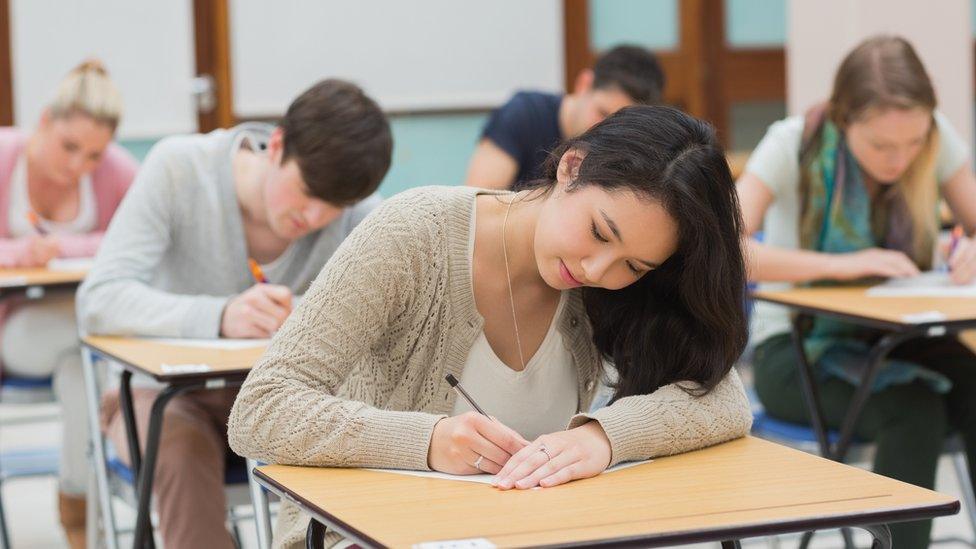A-level results 2019: Key questions
- Published

Around 300,000 teenagers across England, Wales and Northern Ireland are receiving their A and AS-level results. The BBC News website sets out some of the key questions that often crop up.
Are there any changes to A-levels this year?
New A-level syllabuses have been phased into schools in England since 2015. The first new-style exams were in 2017.
The changes mean there is less coursework and students are graded on their performance in end-of-course exams.
AS-levels no longer count towards A-level grades.
The aim of the changes was to upgrade exams and make them tougher, to keep pace with the highest-performing countries.
So what has happened to AS-levels?
AS-levels, in England at least, are on the way out - provisional figures, external from the Department for Education show that the number of entries fell from 659,880 in 2017 to 269,090 in 2018 and to 117,595 in 2019.
But in Wales and Northern Ireland, they still count towards an overall A-level mark.
In Scotland, students do not sit A-levels and AS-levels - they take Highers and Advanced Highers.
The pass rate for Highers fell this year to 74.8%, compared with 76.8% last year, and the Advanced Higher pass rate also fell slightly, to 79.4% from 80.5%.
Can I challenge my results?
If candidates think their grades are wrong, they can ask for their papers to be re-marked. But such requests have to be made through schools and colleges.
There is a fee for this service, which is reimbursed only if there is a grade change. The Joint Council for Qualifications has guidance on the post-results service, external.
What is clearing?
Clearing, external is used by candidates, who want to go to university, to see which courses still have places.
It's the way universities and colleges fill any places they still have on their degree courses. and operates between July and September every year.
So for students who can be flexible and have a reasonably good set of exam results, there is a good chance of finding a course.
Is there anything new about clearing this year?
This year, Ucas has a new feature - online self-release.
This means that instead of having to contact their chosen university or college and wait to be released into clearing, they can do it themselves.
First they must sign in to Ucas's Track, external facility, click the "decline my place" button and then complete a drop-down question before confirming.
What if my results are better than I expected?
For students who exceed their expectations and want to apply for a more competitive course or university, the university admissions service, Ucas, operates a system called adjustment, external.
Adjustment is open from 15 August 2019 until 31 August, during which candidates are allowed five days to show their applications to universities.

Those who don't find a suitable place somewhere else through adjustment, will still be accepted for their original choice.
What about waiting a year for study?
Students can always consider taking a gap year and reapplying for courses or apprenticeships in the autumn to take up a place in 2020.
A year out can be a chance to develop new skills, which may help when writing a personal statement or CV. Volunteer work, travelling abroad or working for a year are all possible options.
Is university the only option?
University is not for everyone and there are definitely other opportunities out there.
Some careers, such as accountancy, can be pursued while working and studying at the same time.
Apprenticeships are another possibility. Vacancies are listed on the National Apprenticeships Service, external website.
There are also degree apprenticeships, external - a new programme offered by some universities - which are being developed by employers, universities, and professional bodies.
Degree apprenticeships combine working with studying part-time at university and can take between three and six years to complete.
Websites such as Not Going to Uni, external offer a range of ideas and alternatives for those who feel university is not for them.